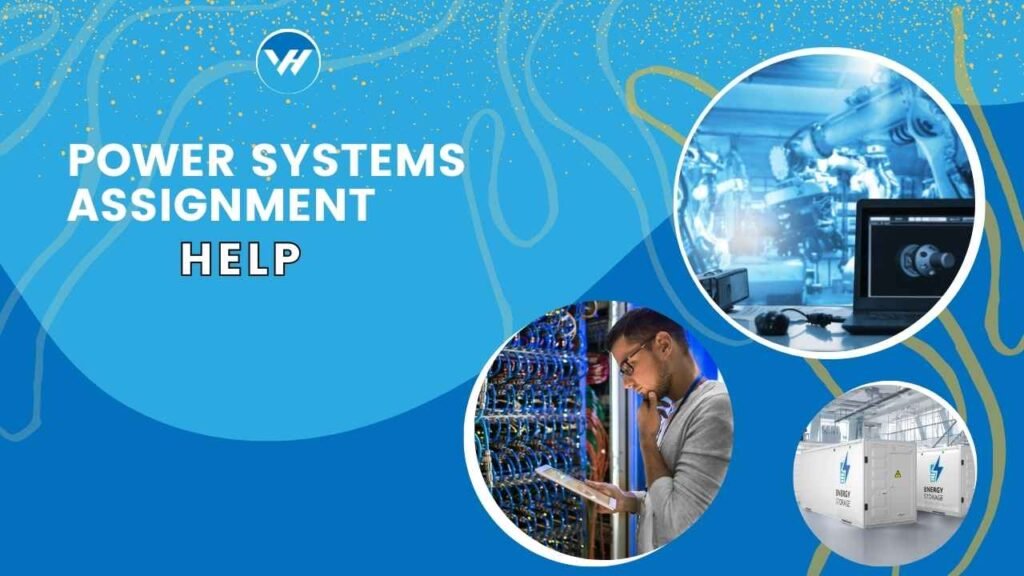Hey there, fellow engineering enthusiasts! Let’s dive into the fascinating world of power systems. If you’re studying electrical engineering, you know that power systems are crucial. They’re the backbone of everything from the electricity that powers our homes to the complex networks that keep industries running. But let’s be real, power systems assignments can be quite the challenge. That’s where Virtual Help steps in, making your life a whole lot easier.

Table of Contents
ToggleUnderstanding Power Systems
Definition of Power Systems
So, what exactly are power systems? Simply put, a power system is a network of electrical components used to supply, transfer, and use electric power. It’s a vast and intricate web that ensures we have electricity whenever and wherever we need it.
Components of Power Systems
Power systems are made up of several key components:
- Generation: Where electricity is produced.
- Transmission: High-voltage power lines that carry electricity over long distances.
- Distribution: The final stage where electricity is delivered to homes and businesses.
- Loads: The devices and equipment that consume electricity.
Types of Power Systems
Electrical Power Systems
These are the traditional systems we’re all familiar with, involving power generation from fossil fuels, nuclear plants, and hydroelectric stations.
Renewable Energy Power Systems
With the push towards sustainability, renewable energy power systems are becoming more prominent. These include solar, wind, and geothermal energy sources.
Smart Grids
Smart grids are the next evolution in power systems, incorporating digital technology to improve efficiency, reliability, and sustainability.
Key Concepts in Power Systems
Power Generation
This is where it all begins. Power generation involves converting energy from various sources into electrical power. It’s a complex process that requires a deep understanding of both theoretical and practical aspects.
Power Transmission
Once power is generated, it needs to be transported to where it’s needed. Transmission systems use high-voltage lines to move electricity over long distances efficiently.
Power Distribution
The final leg of the journey involves distributing electricity to end users. This stage includes substations, transformers, and distribution lines.
Load Flow Analysis
Load flow analysis is a fundamental aspect of power systems, helping engineers understand how electricity moves through the network and ensuring it reaches its destination efficiently.
Fault Analysis
Fault analysis involves identifying and addressing issues within the power system, such as short circuits or equipment failures. It’s crucial for maintaining system reliability and safety.
Stability and Control
Ensuring that a power system remains stable and operates within safe parameters is a key concern. This involves various control strategies and monitoring systems.
Common Power Systems Assignments
Power Flow Studies
These assignments typically involve analyzing the flow of electrical power through a network, using tools like load flow analysis.
Short Circuit Analysis
Short circuit analysis assignments focus on identifying potential fault points in a power system and devising strategies to mitigate them.
System Protection Design
Designing protection systems to prevent and manage faults is another common assignment. This involves understanding protective relays, circuit breakers, and other safety mechanisms.
Renewable Energy Integration
With the shift towards renewable energy, assignments often involve integrating these new sources into existing power systems.
Smart Grid Implementation
Implementing smart grid technologies is a hot topic, requiring a deep understanding of both traditional power systems and modern digital technologies.
Challenges in Power Systems Assignments
Complexity of Calculations
Power systems involve a lot of complex calculations. Whether it’s load flow analysis or fault analysis, getting the numbers right is crucial.
Understanding Theoretical Concepts
Grasping the theoretical concepts behind power systems can be daunting. From electromagnetic theory to control systems, there’s a lot to learn.
Application of Software Tools
Software tools like MATLAB, Simulink, and ETAP are essential for power systems analysis, but they come with a steep learning curve.
Benefits of Getting Assignment Help
Improved Understanding of Concepts
Getting help with your assignments can provide you with a clearer understanding of complex concepts, making your studies more manageable.
High-Quality Solutions
Professionals can provide high-quality solutions that meet academic standards and help you achieve better grades.
Time Management
With assignment help, you can manage your time more effectively, balancing your studies with other commitments.
Better Grades
Ultimately, getting expert help can lead to better grades, enhancing your academic performance and future prospects.
How Virtual Help Can Assist with Power Systems Assignments
Overview of Virtual Help
Virtual Help is your go-to platform for finding tutors and getting assignment help. Whether you’re stuck on a tough problem or need guidance on a project, Virtual Help has got you covered.
Finding Tutors on Virtual Help
Finding the right tutor is a breeze with Virtual Help. You can browse through profiles, read reviews, and select a tutor who fits your needs.
Types of Assistance Available
From one-on-one tutoring sessions to assignment solutions, Virtual Help offers a wide range of services to support your learning journey.
Using Software Tools for Power Systems Assignments
MATLAB
MATLAB is a powerful tool for numerical computing, widely used in power systems analysis for tasks like load flow studies and fault analysis.
Simulink
Simulink, an add-on to MATLAB, is great for modeling and simulating power systems. It allows you to visualize system behavior and test different scenarios.
ETAP
ETAP (Electrical Transient Analyzer Program) is a comprehensive software for electrical power system analysis and operation. It’s particularly useful for designing and testing protection systems.
PSS/E
PSS/E (Power System Simulator for Engineering) is another industry-standard tool used for power flow analysis, stability studies, and more.
Tips for Excelling in Power Systems Assignments
Practice Regularly
The more you practice, the better you’ll get. Regular practice helps reinforce concepts and improve your problem-solving skills.
Join Study Groups
Joining a study group can provide additional support and motivation. You can share ideas, solve problems together, and learn from each other.
Utilize Online Resources
There’s a wealth of online resources available, from tutorials and lectures to forums and research papers. Make use of these to deepen your understanding and find solutions to your problems.
Conclusion
Power systems are a crucial part of electrical engineering, but they come with their own set of challenges. Whether it’s understanding complex concepts, performing intricate calculations, or mastering software tools, there’s a lot to learn. That’s where Virtual Help comes in, providing the support you need to excel. So, don’t hesitate to seek help when you need it. Remember, mastering power systems not only helps you in your studies but also prepares you for a successful career in engineering.
FAQs
How can I understand complex power systems concepts better?
Try breaking down the concepts into smaller, more manageable parts and use visual aids like diagrams and flowcharts. Don’t hesitate to ask for help from tutors or classmates.
What are the best resources for power systems assignments?
Books, academic journals, online courses, and software tool tutorials are great resources. Websites like IEEE and educational platforms like Coursera and Khan Academy can also be very helpful.
How do I choose the right tutor on Virtual Help?
Look for tutors with relevant experience and good reviews. Check their qualifications and see if their teaching style matches your learning preferences.
Can Virtual Help assist with software tool usage?
Absolutely! Tutors on Virtual Help can guide you through the use of various software tools like MATLAB, Simulink, ETAP, and PSS/E, helping you understand and apply them effectively.
What should I do if I’m struggling with a specific topic in power systems?
Focus on understanding the basics first, then gradually move on to more complex topics. Don’t be afraid to ask for help, whether from a tutor, professor, or online community. Regular practice and persistence are key.





